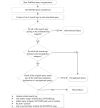Analysis of PubMed User Sessions Using a Full-Day PubMed Query Log: A Comparison of Experienced and Nonexperienced PubMed Users
- PMID: 26139516
- PMCID: PMC4526974
- DOI: 10.2196/medinform.3740
Analysis of PubMed User Sessions Using a Full-Day PubMed Query Log: A Comparison of Experienced and Nonexperienced PubMed Users
Abstract
Background: PubMed is the largest biomedical bibliographic information source on the Internet. PubMed has been considered one of the most important and reliable sources of up-to-date health care evidence. Previous studies examined the effects of domain expertise/knowledge on search performance using PubMed. However, very little is known about PubMed users' knowledge of information retrieval (IR) functions and their usage in query formulation.
Objective: The purpose of this study was to shed light on how experienced/nonexperienced PubMed users perform their search queries by analyzing a full-day query log. Our hypotheses were that (1) experienced PubMed users who use system functions quickly retrieve relevant documents and (2) nonexperienced PubMed users who do not use them have longer search sessions than experienced users.
Methods: To test these hypotheses, we analyzed PubMed query log data containing nearly 3 million queries. User sessions were divided into two categories: experienced and nonexperienced. We compared experienced and nonexperienced users per number of sessions, and experienced and nonexperienced user sessions per session length, with a focus on how fast they completed their sessions.
Results: To test our hypotheses, we measured how successful information retrieval was (at retrieving relevant documents), represented as the decrease rates of experienced and nonexperienced users from a session length of 1 to 2, 3, 4, and 5. The decrease rate (from a session length of 1 to 2) of the experienced users was significantly larger than that of the nonexperienced groups.
Conclusions: Experienced PubMed users retrieve relevant documents more quickly than nonexperienced PubMed users in terms of session length.
Keywords: MEDLINE; PubMed; PubMed query log; experienced users; information retrieval; nonexperienced users.
Conflict of interest statement
Conflicts of Interest: None declared.
Figures






Similar articles
-
A day in the life of PubMed: analysis of a typical day's query log.J Am Med Inform Assoc. 2007 Mar-Apr;14(2):212-20. doi: 10.1197/jamia.M2191. Epub 2007 Jan 9. J Am Med Inform Assoc. 2007. PMID: 17213501 Free PMC article.
-
G-Bean: an ontology-graph based web tool for biomedical literature retrieval.BMC Bioinformatics. 2014;15 Suppl 12(Suppl 12):S1. doi: 10.1186/1471-2105-15-S12-S1. Epub 2014 Nov 6. BMC Bioinformatics. 2014. PMID: 25474588 Free PMC article.
-
A study on PubMed search tag usage pattern: association rule mining of a full-day PubMed query log.BMC Med Inform Decis Mak. 2013 Jan 9;13:8. doi: 10.1186/1472-6947-13-8. BMC Med Inform Decis Mak. 2013. PMID: 23302604 Free PMC article.
-
Comparing image search behaviour in the ARRS GoldMiner search engine and a clinical PACS/RIS.J Biomed Inform. 2015 Aug;56:57-64. doi: 10.1016/j.jbi.2015.04.013. Epub 2015 May 19. J Biomed Inform. 2015. PMID: 26002820
-
Analyzing Medical Image Search Behavior: Semantics and Prediction of Query Results.J Digit Imaging. 2015 Oct;28(5):537-46. doi: 10.1007/s10278-015-9792-6. J Digit Imaging. 2015. PMID: 25810317 Free PMC article. Review.
Cited by
-
Finding the Integrated Care Evidence Base in PubMed and Beyond: A Bibliometric Study of the Challenges.Int J Integr Care. 2018 Aug 17;18(3):11. doi: 10.5334/ijic.3975. Int J Integr Care. 2018. PMID: 30220894 Free PMC article.
-
Cameriere's open apices methodology for dental age estimation in children: a scoping review from a Latin American perspective.Forensic Sci Med Pathol. 2024 Sep;20(3):1049-1057. doi: 10.1007/s12024-023-00646-x. Epub 2023 May 24. Forensic Sci Med Pathol. 2024. PMID: 37222903
-
Representation of Social Determinants of Health terminology in medical subject headings: impact of added terms.J Am Med Inform Assoc. 2024 Nov 1;31(11):2595-2604. doi: 10.1093/jamia/ocae191. J Am Med Inform Assoc. 2024. PMID: 39047296 Free PMC article.
-
Impact of a Search Engine on Clinical Decisions Under Time and System Effectiveness Constraints: Research Protocol.JMIR Res Protoc. 2019 May 28;8(5):e12803. doi: 10.2196/12803. JMIR Res Protoc. 2019. PMID: 31140437 Free PMC article.
-
Forensic odontology and dental age estimation research: a scoping review a decade after the NAS report on strengthening forensic science.Forensic Sci Med Pathol. 2023 Jun;19(2):224-235. doi: 10.1007/s12024-022-00499-w. Epub 2022 Jul 4. Forensic Sci Med Pathol. 2023. PMID: 35781622
References
-
- Downing R, Moore J, Brown S. The effects and interaction of spatial visualization and domain expertise on information seeking. Comput Human Behav. 2005;21(2):195–209.
-
- Rouet J. The Skills of Document Use: From Text Comprehension to Web-Based Learning. Mahwah, NJ: Lawrence Erlbaum Associates, Inc; 2006.
-
- Tenopir C, King D, Boyce P, Grayson M, Zhang Y, Ebuen M. Patterns of journal use by scientists through three evolutionary phases. D-Lib Magazine. 2003 May;9(5) doi: 10.1045/may2003-contents. http://www.dlib.org/dlib/may03/king/05king.html - DOI
-
- De Groote SL, Dorsch JL. Measuring use patterns of online journals and databases. J Med Libr Assoc. 2003 Apr;91(2):231–240. doi: 10.1043/0025-7338(2003)091<0231:MUPOOJ>2.0.CO;2. http://europepmc.org/abstract/MED/12883574 - DOI - PMC - PubMed
-
- Vibert N, Rouet J, Ros C, Ramond M, Deshoullieres B. The use of online electronic information resources in scientific research: The case of neuroscience. Libr Inf Sci Res. 2007 Dec;29(4):508–532. doi: 10.1016/j.lisr.2007.05.001. - DOI
LinkOut - more resources
Full Text Sources
Other Literature Sources

